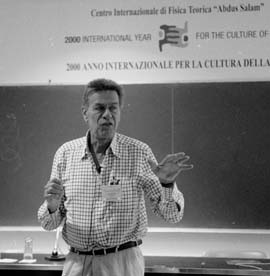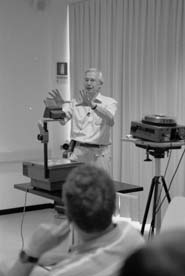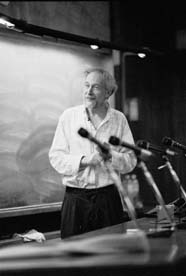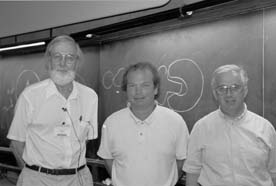Personal tools
News from ICTP 98 - Dateline

Two French-born Nobel Laureates participated in the Adriatico Research Conference on Interaction and Assembly of Biomolecules that took place from 27-31 August.

Pierre-Gilles de Gennes, who lectured on "Artificial Muscles," is a professor at the College de France in Paris. A 1991 recipient of the Nobel Prize in Physics, he is known as the 'prophet of soft matter.'

Jean-Marie Lehn, who was awarded the 1987 Nobel Prize
in Chemistry, lectured on "Supramolecular Engineering through
Programmed Self-Organization." Lehn, who teaches at the Universite
Louis Pasteur in Strasbourg, France, received an honorary
degree from the University of Trieste last May.
Four Fields Medallists recently gave lectures at ICTP.

Alain Connes, Institut des Hautes Etudes Scientifiques, Bures-sur-Yvette, France, who received the Fields Medal in 1982 for his contributions to the theory of operator algebras, spoke in March at the Workshop on Quantum Field Theory, Noncommutative Geometry and Quantum Probability.

John Milnor, Jean-Christophe Yoccoz and Gregori Margulis
Three other Fields Medallists lectured at the School and Workshop
on Dynamical Systems, held between July and August. John Willard
Milnor, Princeton University, who spoke about the increasingly
important role played by mathematics in genetics, won the Fields
Medal in 1962 for his proof that a seven-dimensional sphere can
have several different structures. Gregori Aleksandrovic Margulis,
Yale University, who spoke about geometry of numbers and inequalities
for integral operators, earned the Fields Medal in 1978 for his
pathbreaking insights on subgroups of Lie groups. Jean-Christophe
Yoccoz, College de France, who spoke about "Quasi-Periodic
Dynamics for p-adic Rational Maps," was awarded the Fields
Medal in 1994 for his unique contributions to our understanding
of dynamical systems. The Fields Medal, which began in 1936, is
considered the world's highest honour in mathematics.
Trieste's scientific community has honoured two of its most
celebrated citizens. Paolo Budinich, one of the founding
fathers of ICTP as well as a host of other scientific institutions
in Trieste, including SISSA (International School for Advanced
Studies), and a leading advocate of scientific cooperation with
central and eastern European countries, was honoured on the occasion
of his 85th birthday at the International Conference on Science
and Culture held in Losinj, Croatia, on 17-19 September. Meanwhile,
a Symposium on Future Challenges in Science, "dedicated to
Daniele Amati for his next 70 years," took place in
ICTP's Main Building on 22 September. Amati succeeded Budinich
as director of SISSA in 1986 and then served in that capacity
for the next 15 years (he will be stepping down as director this
fall). The event also served as an occasion to celebrate Amati's
70th birthday.

John J. Hopfield, one of the world's top physicists
who has successfully crossed interdisciplinary boundaries (he
is a professor in the department of molecular biology at Princeton
University), is the recipient of the 2001 Dirac Medal of ICTP.
The citation announcing the award states that Hopfield "has
made important contributions in an impressively broad spectra
of scientific subjects." After applying his research talents
to light-emitting diodes early in his career, Hopfield turned
to biology, where his 'Hopfield model' of neural processing demonstrated
"how qualitatively different computation in a computer and
in the brain could be." For additional information about
the Dirac Medal, see the Centre's web
page. The award ceremony will take place at a later date.
Fedor Mesinger, adjunct staff member in ICTP's Weather
and Climate Group, has won the European Geophysical Society's
Vilhelm Bjerknes Medal. The medal, established in 1995, is given
annually to a distinguished researcher in atmospheric science.
Mesinger, who was educated and taught for many years at the University
of Belgrade,Yugoslavia, is currently a scientist at the National
Center for Environmental Prediction's Environmental Modeling Center
(USA). He is an internationally recognised expert in the field
of numerical modelling of the atmosphere and, more generally,
the science of weather prediction. The Eta Model, which he designed,
is now used for weather prediction at the US National Center for
Environmental Modeling in the United States and an increasing
number of weather forecast centres around the world. Mesinger
returned to ICTP this summer for a six-week stay.
More than 40 schools, colleges, workshops and conferences are
listed in ICTP's preliminary 2002 Scientific Calendar. The first
activity, beginning 4 February, will be the Joint ICTP-INFM (Italian
Institute for the Physics of Matter) School in "High Performance
Computing on Linux Clusters." Next year's calendar covers
a wide spectrum of topics: from the physics of weather and climate
to superstrings, from synchrotron radiation to astroparticle physics,
and from seismic waves to quantum dynamics. Three activities will
take place outside Trieste: the Regional Course on System Simulation
and Hardware Synthesis Using VHDL (Lima, Peru); the Workshop on
Frontiers of Materials Science (Santiago, Chile); and the ICTP
Microprocessor Laboratory First Middle East Course on Advanced
VLSI Design Techniques Using a Hardware Description Language (venue
to be determined). The 2002
Calendar is available on the web.
The 45th Regular Session of the General Conference of the International
Atomic Energy Agency (IAEA), which was held at the organisation's
headquarters in Vienna from 17 to 21 September, included a two-hour
special presentation by ICTP director Miguel Virasoro. The special
presentation focussed on the role of science in economic development
and outlined new ICTP/IAEA activities.